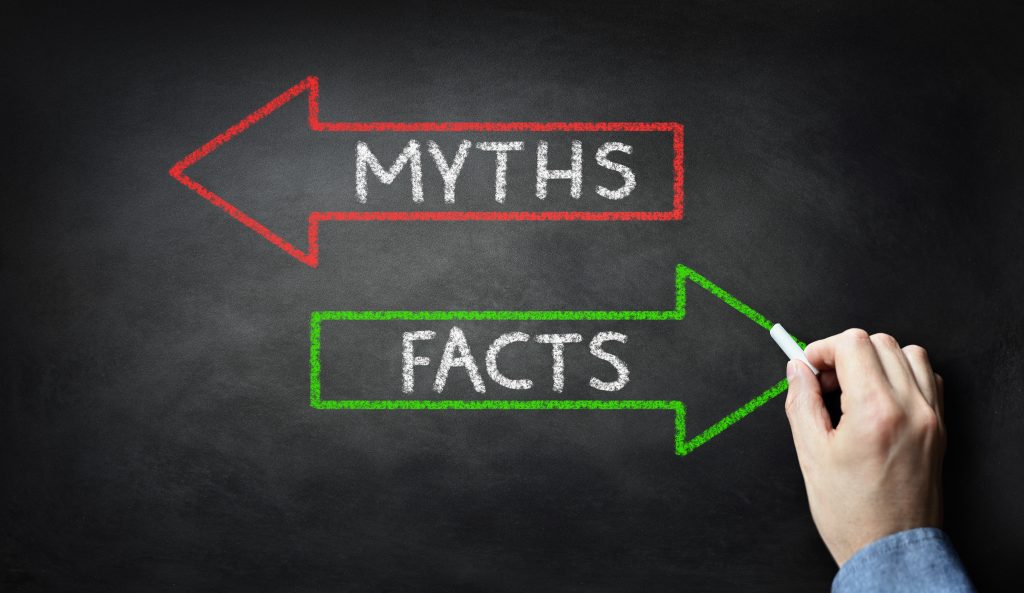7 Plumbing Myths Debunked or Proven

7 Plumbing Myths Tackled
Too often we hear a number of myths from our customers regarding their home's plumbing. From lemon peels into the garbage disposal to whether flushable wipes are truly that, our team of licensed plumbers address each one and either debunk or prove it.
Myth Number One
Ice Sharpens Your Garbage Disposal Blades
It's commonly touted that putting ice down a garbage disposal is good for sharpening its blades/impeller. But is this accurate?
The Theory
The idea behind putting ice down the garbage disposal to sharpen the blades is that the texture and density of ice is perfect for sharpening the blades. On impact, it is theorized the ice breaks up harmlessly after giving a sharpening effect.
The Truth: DEBUNKED
Although this is completely false that ice will sharpen your disposal's blades, there is a different reason to put it down the drain and grind it up. Grinding up ice is a great way to clean the blades of your garbage disposal. The cubes harmlessly break apart and take with them stuck-on food particles that can cause nasty odors.
Myth Number Two
Drain Cleaning Chemicals Are Safe to Use
Clogged drains are a terrible inconvenience. Most homeowners turn to chemical clog removers and cleaners instead of calling a plumber. But is this safe?
The Theory
Consumers tend to think that if a product is for sale over-the-counter then it must be safe, and that makes sense, right? If it wasn't safe they surely wouldn't sell it, would they?
The Truth: DEBUNKED
Drano and other over-the-counter drain cleaners are actually not safe for your drains. Additionally, these products are extremely harmful to the environment. There are safer and better ways to unclog a toilet or other drain.
Myth Number Three
Running Hot Water Helps Grease Go Down the Drain
Keeping the hot water running helps hot grease flow freely through your drains and out to the city sewer. At least, that's what some people say.
The Theory
Hot grease if it is kept hot stays liquid, right? Pushing hot water behind the grease you just poured down the sink can help it stay in liquid form and avoid clogging up your drains.
The Truth: DEBUNKED
Not even close. Grease coagulates pretty quickly, especially when it makes contact with water. Even if the boiling water helps it maintain its liquid state a little longer, it will certainly clog further down the line. Never pour grease down your drain unless you're just looking to spend money with a plumber.
Myth Number Four
My Toilet Can Handle Flushable Wipes
It's in the very name that flusable wipes are safe to flush down the toilet, but is it really safe?
The Theory
Companies advertising 'flushable' wipes boast a product that supposedly can break down like toilet paper. They're comprised of material claimed to be biodegradable and safe for sewers.
The Truth: DEBUNKED
Flushable wipes should be called more flushable wipes to be more accurate. Unlike other products, these can break down better than traditional baby wipes and such, but they're not the same as toilet paper. They stay in solid state for a long time and can cause clogs and other issues like damage to your grinder pump.
Myth Number Five
Lemons Are Good for Garbage Disposals
Lemons are said to be good for cleaning garbage disposals. Their sweet and tart smells and rich natural acids are supposed to tackle those funky odors your garbage disposal may struggle with.
The Theory
Garbage disposals are made to process food, so it makes sense that they can grind up a lemon. The acidity and natural aroma are theorized to work in conjunction to clean your garbage disposal naturally.
The Truth: PROVEN
Lemons when cut into small wedges and ground through a garbage disposal do actually help clean it. They're safe and effective in deodorizing and cleaning your home's disposal. However, their peels do pose a small risk of getting lodged in the disposal. To avoid this, be sure to cut the lemon into manageable sizes that can easily be ground up and drained away.
Myth Number Six
It's Safe to Take a Shower During a Lightning Storm
Home's, especially modern ones, are well grounded and even have surge protection. So how at-risk are you when showering during a lightning storm?
The Theory
Whole-home surge protection, grounding, pex piping, and other protectors and non-conducting components lend credence to the theory that you're not at any real risk showering during a lightning storm. But is it correct?
The Truth: DEBUNKED
Lightning absolutely can travel through any type of piping and electrocute you during a shower. Even if the piping material is non-conductive, water is highly conductive. For safety's sake, it's always best not to shower during a lightning storm, especially if you're living in an area highly prone to lightning strikes.
Myth Number Seven
In-Tank Toilet Cleaning Tablets Are Safe
Cleaning toilets is never fun. Using a tablet you can simply pop into the tank and let set is an easy way to maintain cleanliness in your toilet bowl. But is it doing more harm than good?
The Theory
Porcelain isn't greatly affected by cleaners like bleach, therefore it's safe to have a steady supply of it passing through your toilet, right?
The Truth: DEBUNKED
Although porcelain isn't going to be generally affected by bleach tablets and other toilet tabs, there's more to your tank than just porcelain. Caustic chemicals like bleach can eat away at gaskets and plastic pieces inside of the tank resulting in leaks or premature parts failure.
Have a Plumbing Myth You Want Debunked or Proven?
Our team of licensed plumbers have the experience to prove or disprove any plumbing myth you throw our way. If you're needing help figuring out the best course of action with your plumbing and aren't sure what is fact or fiction, give us a call. We'll get the facts straight for you.